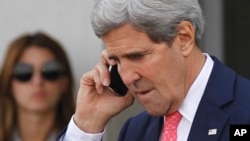WASHINGTON —
The Obama administration is facing a scheduling crisis. It is involved in nearly simultaneous negotiations on two of the most contentious issues in the Middle East: Iran’s nuclear program and the Israeli-Palestinian dispute. Are the two issues linked? And will success or failure with either set of talks affect the outcome of the other?
Aaron David Miller, Vice President for New Initiatives at the Washington-based Wilson Center’s Middle East Program, believes that the P5+1 nuclear talks with Iran were orchestrated based on a premise that if the US addressed Israel concerns on Iran, then Israel might then come to a deal with the Palestinians – something he says was a mistake.
“But I think that’s an idealized logic, and it seems almost now very unhappy and unlucky that these two negotiating tracks will come to fruition roughly around the same time—because if there is no deal that satisfies the Israelis on Iran, there is absolutely no way that the Israeli prime minister is going to be in a mood or have the motivation to make big decision on the Palestinian-Israeli track,” he said.
Miller believes the Israeli-Palestinian negotiations are in deep trouble, unrelated to what he calls the “ill-advised timing” of Iran talks.
“You have leaders who are risk-averse, not risk-ready,” he said. “You have large gaps between the two sides. You don’t have the kind of urgency that is required to create the pain and the prospects of pain necessary for a deal. And it is yet to be determined whether or not you have a third party, namely the United States that is prepared to do what is necessary—assuming all the other factors are in place."
“The tougher the US is on Iran, the more leverage it has pushing Israel toward concessions on the Palestinians,” Bard College Professor Walter Russell Meade predicted in an October blog post. “The more risks the Administration takes and concessions it makes to get a deal with Iran, the tighter the Israelis are tempted to circle the wagons.”
The Israeli Prime Minister seemed to confirm that point in remarks ahead of meeting Secretary of State John Kerry November 8.
“Israel is not obliged by this agreement and Israel will do everything it needs to do defend itself and to defend the security of its people,” Netanyahu said. “That is true also of our negotiations with the Palestinians. I will never compromise on Israel’s security and our vital interests, not in the face of any international pressure. I think the pressure needs to be put on the Palestinians, who refuse to budge.”
Yousef Munayyer, Executive Director of Washington, DC-based Jerusalem Fund, explains that in international bargaining, there is always some linkage of the issues.
“Those who link these two issues believe Netanyahu really wants the US to do something about Iran,” he said. “What I mean by that is that the Israeli Prime Minister has very successfully used the issue of Iran to deflect attention away from the incessant settlement expansion that has happened, particularly under his time in the premiership.”
Pushing Iran to the top of the global agenda, says Munayyer, focuses international attention away from the peace process, where nothing has transpired. And, on top of that, he says, “the Palestinian negotiating team has resigned.”
To the Administration’s way of thinking, as John Kerry recently told Israeli television, once Israel signs a peace deal with the Palestinians, the remaining 19 or 20 countries which have not made peace with Israel – will do so immediately.
But for now Israel’s attention is focused on what will happen in Geneva. It also seems increasingly likely that any deal struck between the six world powers and Iran will be rejected by Israel, making Netanyahu even less willing to agree to any U.S. mediation efforts aimed at bringing Israelis and Palestinians back to the negotiating table.
Aaron David Miller, Vice President for New Initiatives at the Washington-based Wilson Center’s Middle East Program, believes that the P5+1 nuclear talks with Iran were orchestrated based on a premise that if the US addressed Israel concerns on Iran, then Israel might then come to a deal with the Palestinians – something he says was a mistake.
“But I think that’s an idealized logic, and it seems almost now very unhappy and unlucky that these two negotiating tracks will come to fruition roughly around the same time—because if there is no deal that satisfies the Israelis on Iran, there is absolutely no way that the Israeli prime minister is going to be in a mood or have the motivation to make big decision on the Palestinian-Israeli track,” he said.
Miller believes the Israeli-Palestinian negotiations are in deep trouble, unrelated to what he calls the “ill-advised timing” of Iran talks.
“You have leaders who are risk-averse, not risk-ready,” he said. “You have large gaps between the two sides. You don’t have the kind of urgency that is required to create the pain and the prospects of pain necessary for a deal. And it is yet to be determined whether or not you have a third party, namely the United States that is prepared to do what is necessary—assuming all the other factors are in place."
“The tougher the US is on Iran, the more leverage it has pushing Israel toward concessions on the Palestinians,” Bard College Professor Walter Russell Meade predicted in an October blog post. “The more risks the Administration takes and concessions it makes to get a deal with Iran, the tighter the Israelis are tempted to circle the wagons.”
The Israeli Prime Minister seemed to confirm that point in remarks ahead of meeting Secretary of State John Kerry November 8.
“Israel is not obliged by this agreement and Israel will do everything it needs to do defend itself and to defend the security of its people,” Netanyahu said. “That is true also of our negotiations with the Palestinians. I will never compromise on Israel’s security and our vital interests, not in the face of any international pressure. I think the pressure needs to be put on the Palestinians, who refuse to budge.”
Yousef Munayyer, Executive Director of Washington, DC-based Jerusalem Fund, explains that in international bargaining, there is always some linkage of the issues.
“Those who link these two issues believe Netanyahu really wants the US to do something about Iran,” he said. “What I mean by that is that the Israeli Prime Minister has very successfully used the issue of Iran to deflect attention away from the incessant settlement expansion that has happened, particularly under his time in the premiership.”
Pushing Iran to the top of the global agenda, says Munayyer, focuses international attention away from the peace process, where nothing has transpired. And, on top of that, he says, “the Palestinian negotiating team has resigned.”
To the Administration’s way of thinking, as John Kerry recently told Israeli television, once Israel signs a peace deal with the Palestinians, the remaining 19 or 20 countries which have not made peace with Israel – will do so immediately.
But for now Israel’s attention is focused on what will happen in Geneva. It also seems increasingly likely that any deal struck between the six world powers and Iran will be rejected by Israel, making Netanyahu even less willing to agree to any U.S. mediation efforts aimed at bringing Israelis and Palestinians back to the negotiating table.





